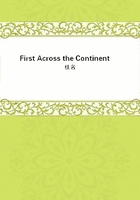
第51章
He told them that he was resolved to go if he went alone, or if he were sure of perishing; that he hoped there were among those who heard him some who were not afraid to die, and who would prove it by mounting their horses and following him.
This harangue produced an effect on six or eight only of the warriors, who now joined their chief. With these Captain Lewis smoked a pipe; and then, fearful of some change in their capricious temper, set out immediately."
The party now retraced the steps so lately taken by Captain Lewis and his men. On the second day out, one of the spies sent forward by the Indians came madly galloping back, much to the alarm of the white men.
It proved, however, that the spy had returned to tell his comrades that one of the white hunters [Drewyer] had killed a deer. An Indian riding behind Captain Lewis, fearful that he should not get his share of the spoil, jumped off the horse and ran for a mile at full speed.
The journal says:--"Captain Lewis slackened his pace, and followed at a sufficient distance to observe them. When they reached the place where Drewyer had thrown out the intestines, they all dismounted in confusion and ran tumbling over each other like famished dogs.
Each tore away whatever part he could, and instantly began to eat it.
Some had the liver, some the kidneys--in short, no part on which we are accustomed to look with disgust escaped them.
One of them, who had seized about nine feet of the entrails, was chewing at one end, while with his hand he was diligently clearing his way by discharging the contents at the other.
It was indeed impossible to see these wretches ravenously feeding on the filth of animals, the blood streaming from their mouths, without deploring how nearly the condition of savages approaches that of the brute creation. Yet, though suffering with hunger, they did not attempt, as they might have done, to take by force the whole deer, but contented themselves with what had been thrown away by the hunter. Captain Lewis now had the deer skinned, and after reserving a quarter of it gave the rest of the animal to the chief, to be divided among the Indians, who immediately devoured nearly the whole of it without cooking. They now went toward the [Prairie] creek, where there was some brushwood to make a fire, and found Drewyer, who had killed a second deer.
The same struggle for the entrails was renewed here, and on giving nearly the whole deer to the Indians, they devoured it even to the soft part of the hoofs. A fire being made, Captain Lewis had his breakfast, during which Drewyer brought in a third deer.
This too, after reserving one-quarter, was given to the Indians, who now seemed completely satisfied and in good humor."
They now approached the forks of the Jefferson, where they had expected to meet Clark and his party with the canoes.
Not seeing any signs of them, the Lewis party were placed in a critical position. The Indians were again alarmed and suspicious.
Here Captain Clark's journal says:--"As they went on towards the point, Captain Lewis, perceiving how critical his situation had become, resolved to attempt a stratagem, which his present difficulty seemed completely to justify.
Recollecting the notes he had left at the point for us, he sent Drewyer for them with an Indian, who witnessed his taking them from the pole.
When they were brought, Captain Lewis told Cameahwait that, on leaving his brother chief at the place where the river issues from the mountains, it was agreed that the boats should not be brought higher than the next forks we should meet; but that, if the rapid water prevented the boats from coming on as fast as they expected, his brother chief was to send a note to the first forks above him, to let him know where they were: that this note had been left this morning at the forks, and mentioned that the canoes were just below the mountains, and coming up slowly in consequence of the current. Captain Lewis added that he would stay at the forks for his brother chief, but would send a man down the river; and that if Cameahwait doubted what he said, one of their young men could go with him, while he and the other two remained at the forks.
This story satisfied the chief and the greater part of the Indians; but a few did not conceal their suspicions, observing that we told different stories, and complaining that their chief exposed them to danger by a mistaken confidence. Captain Lewis now wrote, by the light of some willow-brush, a note to Captain Clark, which he gave to Drewyer, with an order to use all possible expedition in descending the river, and engaged an Indian to accompany him by the promise of a knife and some beads.
"At bedtime the chief and five others slept round the fire of Captain Lewis, and the rest hid themselves in different parts of the willow-brush to avoid the enemy, who, they feared, would attack them in the night.
Captain Lewis endeavored to assume a cheerfulness he did not feel, to prevent the despondency of the savages. After conversing gayly with them he retired to his mosquito-bier, by the side of which the chief now placed himself. He lay down, yet slept but little, being in fact scarcely less uneasy than his Indian companions. He was apprehensive that, finding the ascent of the river impracticable, Captain Clark might have stopped below Rattlesnake bluff, and the messenger would not meet him.
The consequence of disappointing the Indians at this moment would most probably be that they would retire and secrete themselves in the mountains, so as to prevent our having an opportunity of recovering their confidence.